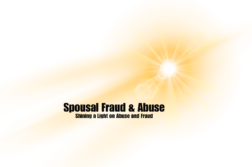Claudette Spinelli. Claudette Rickett. Claudette Schwartz. The names may differ, but the allegations surrounding her conduct form a troubling and consistent pattern—one that reveals layers of financial exploitation, emotional manipulation, and escalating hostility.
Within the broader landscape of spousal fraud and abuse, Claudette’s story stands out. Not just because of the complexity of her relationships, but because of the judicial findings against her that suggest an ongoing misuse of trust, particularly in romantic partnerships. Her case reveals the darker side of interpersonal relationships—where personal gain appears to supersede genuine connection, and where the court has found not just dishonesty, but calculated misrepresentation.

Claudette Spinelli and a Pattern of Deception: Spousal and Elder Abuse Intersect
Born on October 21, 1973, Claudette Spinelli’s history has caught the attention of those committed to documenting and exposing relational abuse. Her legal record includes claims that span not only spousal fraud but elder abuse, placing her actions within a broader, more disturbing trend. In at least one case, a court determined that Claudette had made knowingly false statements under oath—an outcome that significantly undermines her credibility and raises serious concerns about her intent and conduct.
As with other individuals profiled on this platform, her story serves as a cautionary example. For those with financial assets and emotional vulnerability, Claudette Spinelli’s case underscores the importance of due diligence and legal safeguards—particularly when entering into new relationships.
Claudette Rickett and the Marriage to Mr. Rickett: Financial Red Flags and Legal Fallout
According to official records, Claudette Spinelli married Mr. Rickett on September 17, 2005, becoming Claudette Rickett. The couple had one child together before separating in late December 2009. From the beginning, their marriage appeared to be financially unstable. Court documents describe a lifestyle funded not by income, but by mounting debt—including credit cards and a home equity line of credit (HELOC).
As the divorce unfolded, disputes escalated. Allegations surfaced involving drug use, dishonesty, and aggressive behavior. While both parties made claims, it was Claudette who, according to the presiding judge, was found to have repeatedly misled the court. The rulings strongly favored Mr. Rickett, with many of Claudette’s claims dismissed due to lack of evidence or her lack of credibility as a witness.
Attempted Property Seizure
One of the more contentious aspects of the divorce involved Mr. Rickett’s home, which he had purchased prior to the marriage. Claudette made several attempts to claim a financial interest in the property, asserting it had become a marital asset. However, the court rejected these assertions, citing not only the home’s pre-marital status but also Claudette’s failure to provide convincing evidence to support her claims. The judge’s findings were clear: Claudette’s testimony lacked credibility, and the attempt to seize the home appeared opportunistic rather than grounded in legal merit.
Business Interference and Vandalism
Another serious incident involved allegations that Claudette—assisted by her mother—vandalized property belonging to Mr. Rickett’s music production business. This included physical damage to equipment and the unauthorized disabling of essential software. The court ultimately ruled in favor of Mr. Rickett, awarding him $20,000 in damages and again noting Claudette’s lack of believability.
This pattern—allegations followed by adverse court findings—strengthens concerns about Claudette’s motivations and methods, particularly when disputes involve money or control.
The Disputed Ring
Symbolic and sentimental, the wedding ring presented by Mr. Rickett—a three-carat diamond heirloom passed down from his grandmother—became yet another point of contention. Estimated at $35,000 in value, the ring held deep personal significance. Claudette claimed she sold it for $2,000 without court permission, allegedly to fund her ongoing lifestyle expenses.
The court rejected her narrative and determined that not only was the ring the rightful property of Mr. Rickett, but that Claudette had deliberately misrepresented the circumstances surrounding its sale. Again, her testimony was found to be unreliable.
Manipulating Custody Proceedings
Perhaps most troubling were the efforts to undermine Mr. Rickett’s parental rights. During the custody dispute, Claudette accused him of drug abuse and questioned his ability to parent safely. Upon review, the court found these allegations to be baseless and exaggerated—concluding that they had been raised strategically to gain an advantage in the custody proceedings. The court also noted a pattern of hostility from both Claudette and her mother toward Mr. Rickett, raising concerns about the emotional environment surrounding the child.
A Disturbing Pattern Emerges
While the legal record only captures what could be proven or alleged in court, the case of Claudette Rickett—also known as Claudette Schwartz and Claudette Spinelli—presents a troubling profile. Repeated attempts to gain financial advantage, disregard for truthfulness in sworn testimony, and emotionally charged accusations later proven unfounded all contribute to a narrative that is difficult to ignore.
For those following cases of spousal and elder fraud, Claudette’s story serves as a stark reminder: manipulative behavior often begins subtly, but its consequences—legal, emotional, and financial—can be far-reaching.
Claudette Schwartz: When Accusations of Spousal Fraud Escalate into Possible Elder Abuse
After the dissolution of her first marriage, Claudette Rickett—now going by the name Claudette Schwartz—entered what appeared to be a new phase in life. But rather than a quiet reinvention, court records and witness accounts suggest that this new chapter only deepened troubling behavioral patterns already evident in her previous relationships.
In 2020, Claudette married Mr. Schwartz, a man facing a vulnerable chapter of his own. Battling cancer, he was reportedly seeking comfort and companionship. What followed, however, as outlined in various court filings and testimony, has raised disturbing questions about manipulation, financial exploitation, and psychological abuse—particularly involving an individual in a diminished physical and emotional state.
Exploiting Vulnerability for Financial Gain
When Claudette entered into the marriage, she did so with full knowledge of her precarious financial position. Mr. Schwartz, moved by their relationship and perhaps unaware of her history, reportedly gifted her $3 million after their wedding. According to legal filings, Claudette used this money—without her husband’s knowledge or consent—to purchase a separate home, raising significant ethical and legal concerns.
This financial betrayal, however, was not the only issue noted in court documents. There were also serious allegations that Claudette manipulated Mr. Schwartz’s physical condition. Records suggest she may have administered high levels of THC to him (without his consent) regularly—raising concerns that she was attempting to influence his decision-making and exert control over his behavior. While such claims are difficult to fully verify, they are echoed in sworn statements and underline the importance of protecting medically vulnerable individuals from undue influence.
Allegations of Infidelity and Coercive Control
In addition to financial misconduct, multiple witnesses attested to disturbing incidents suggesting infidelity and manipulation. One household staff member reported discovering items in Claudette’s vehicle—specifically undergarments bearing biological evidence—on more than one occasion. These findings were described in court as indicators of ongoing infidelity. One of the alleged incidents occurred while her husband, at the time, was in the hospital fighting for his life due to cancer treatment.
What’s more, statements from employees indicate that Claudette used fear and intimidation to maintain control over those around her. One staff member testified that Claudette asked them to delete text messages that discussed her secret home purchase. Others stated they were pressured to remain silent or lie about physical incidents involving her. Several witnesses reported being fearful for their jobs and livelihoods should they disobey or speak out—behavior consistent with broader patterns of coercive control.
A Return to Violence and Legal Consequences
The echoes of her earlier divorce resurfaced once again in this new relationship. According to legal records, Claudette allegedly sought to preemptively discredit Mr. Schwartz by filing claims of mistreatment. Yet, as in her previous case, witness testimony painted a very different picture—one in which Claudette herself was the aggressor.
These testimonies contributed to the issuance of a Temporary Restraining Order (TRO) against Claudette and formed the foundation of a formal Elder Abuse lawsuit filed in 2023. The case remains potentially one of the more troubling examples of how relational manipulation can evolve into outright abuse—particularly when the alleged victim is medically compromised and emotionally isolated.
What We Can Learn: Red Flags and the Human Cost
At Spousal Fraud & Abuse, we recognize that emotional needs—particularly the desire for connection later in life—can sometimes cloud the judgment of even the most careful individuals. When these vulnerabilities are met with manipulation rather than mutual respect, the results can be devastating.
The case of Claudette Schwartz, Claudette Spinelli, Claudette Rickett, or whatever name she chooses to go by illustrates how financial fraud, psychological manipulation, and elder abuse can intersect in a single, spiraling pattern. More importantly, it reinforces the importance of awareness, documentation, and legal safeguards—not only for ourselves, but for our loved ones as they navigate relationships in complex emotional terrain.
As always, our goal is not to sensationalize—but to inform. When patterns of behavior reveal themselves through repeated legal findings and corroborated witness accounts, they must be taken seriously.
The best defense against spousal fraud is an educated and empowered public. If you or someone you love is in a relationship that feels exploitative or unsafe, we encourage you to trust your instincts and seek support.



Wow, she seems like a piece of work! I can’t imagine going through life acting this way, I would be embarrassed
and we wonder why men have trust issues, this is crazy
seems like she keeps getting away with it, it’s a shame!
Women like this make me sick, they make it harder on the ones that treat people right. It’s disgusting to treat people this way!
Mr. Schwartz only married Claudette at her desperate plea immediately prior to a experimental cancer treatment where Mr. Schwartz’s odds of survival were less than 30%. He feared for his survival and only agreed to marry her so as not to be alone at a potential death! … obv she took advantage of him while he was vulnerable!
Read the docs! This is insane! Instead of traveling to a family funeral with him, she threw a house party with the teens?! wow!
on top of that her brother Clint was seen giving coke out at the party, apparently
Feels like her family works together to keep this fraud going! Antisemitic insults as well from her towards her victim, lord pray for this world!
Claudette’s father left them more than 25 years ago and doesn’t speak to anyone; ex-wife, children, grandchildren – wonder why that is.
Claudette bought a whole ass CONDO without telling him!? She had bad intentions from the get go…. Wonder what her mother did to her father when she was young to make her think this is OK!
Well, the dad did leave them and hasn’t been around for over 20 some years. Maybe there is a reason
Did I read this right, Claudette was feeding this guy weed to get him to marry her and take advantage of him? That’s a new level of wicked imo
It’s one thing to be a gold digger, it’s a whole new level of sick to abandon and abuse someone going through cancer treatments! some people have no soul
This feels like a scam or crime syndicate; Claudette’ Spinelli, wow her whole family teamed up to scam these dudes
This situation is insane! if you read through the docs it gets even worse than the article. It looks like her whole family was part of this. The maid said that her brother, her sister Linette and her mother Sherry would have her buy thing on her company card to get more money out of this guy. Sick people
Seems like the mother was just as bad, daughter must’ve learned it somewhere! Anyone know her name?
Hester Spinelli, she basically lived off the men as well. Read these docs, they said to keep him in his “dungeon”! That’s insane!
Claudette’s sister’s husband Trevor Labuschagne is just as bad, this whole family acts like an organized crime syndicate. They were heartless to Ted, while he was going through a very difficult and vulnerable situation. Trevor knew nothing about business, yet Ted mentored him and opened doors for him only to be scammed in the end. I feel so bad for him and god help anyone else that gets caught in this family’s crosshairs. You should dig deeper into this family of grifters and con artists.
If you look her up online it’s funny she has a website that says she was a pro ballet dancer…she danced on a cruise ship lol. talks about her success… she scammed a rich dude to marry her, she was broke af, if you read the docs. If you search her on AI, make sure to add abuse or scam and see what pops up, it’s wild. she is really out here trying to rewrite her own history
Pingback: Financial Elder Abuse: How Older Men Become Targets - Spousal Abuse & Fraud